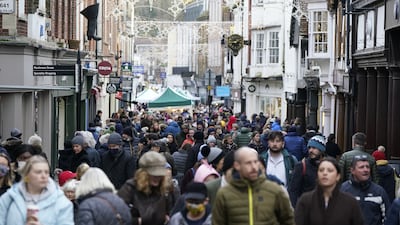Live updates: follow the latest news on Covid-19 variant Omicron
Britain’s Prime Minister Boris Johnson this week imposed his Plan B set of Covid restrictions, saying they are necessary to curb the spread of the Omicron variant.
On Wednesday he said this was the time to act after government advisers said cases of the strain are rising fast.
Mr Johnson's announcement came as a scandal continued to engulf the government over an alleged lockdown-breaking Christmas party at Downing Street in December last year.
The prime minister has ordered an investigation into the event, which is said to have been held in breach of previous restrictions. The row threatens to undermine his authority as new measures are rolled out.
The new rules will impose drastic changes on tens of millions of people in the run-up to the Christmas holidays and could throw planned celebrations into doubt.
Devolved administrations in Scotland, Wales and Northern Ireland decide their own Covid-19 restrictions.
Setting out his winter plan to tackle Covid-19 in September, Mr Johnson said he would impose extra measures if it was necessary to protect the NHS – the UK's publicly funded healthcare system.
The Plan B restrictions announced on Wednesday include:
· Vaccine certificates at nightclubs and potentially crowded venues from next week
· Mandatory wearing of face masks in most public indoor settings including cinemas and theatres, from December 10
· A working-from-home order for anyone who does not have to be in their workplace, from December 13
· Communicating clearly and urgently to the public if the risk level increases
The plan includes daily testing for people identified as a contact of a person infected with Covid. Only those who test positive will have to self-isolate.
'Omicron spreading faster than other variants'
Last month, after the Omicron variant was discovered in the UK, face masks were made mandatory on public transport and in shops. Restaurants and pubs are not included in this directive.
Health Secretary Sajid Javid told Sky News that ministers have learnt that Omicron “spreads faster than any other variant we’ve seen before” and the new rules aimed to “buy time” to build defences against the strain.
Pressed on whether Covid vaccination would become mandatory for the population, he said any such rule would be unethical.
“I’ve got no interest in mandatory vaccination apart from the high-risk settings in the NHS and social care, which we’ve already set out we will legislate for,” he said. “Other than that, if you’re talking about universal mandatory vaccination I think ethically it’s wrong but also, at a very practical level, it just wouldn’t work. Getting vaccinated has to be a positive decision.”
Prof Mike Tildesly, an infectious disease expert who advises the government on Covid, said early studies suggest Omicron is “more transmissible” than the Delta variant that quickly outpaced the Alpha variant in the UK.
But he said there was a lot of uncertainty around Omicron and cases of it are “relatively low” at this stage, although numbers are expected to grow over the coming weeks.
Asked how the emergence of the variant might affect hospital admissions in the UK, he said a clearer picture would emerge in about two to three weeks when “we see infections potentially jump to older people who are likely to be more vulnerable to severe symptoms”.
On whether the Plan B measures were enough to delay the peak of the Omicron wave until the end of January when all adults in England are expected to have been offered a booster, he said it was difficult to say.
“Unfortunately, I’m in a position where I can’t lay my hat on that quite yet because of all the uncertainty around exactly how rapidly it is growing,” he told the BBC Radio 4’s Today programme.
“Obviously the slower it’s growing the longer time we have to get everyone a booster, but obviously any measures you put in will help to slow that rate to grow,” he said.
Prof Neil Ferguson, head of the Department of Infectious Disease Epidemiology at Imperial College London, said on Wednesday that another lockdown cannot be ruled out.
The scientist, whose modelling was instrumental in the government’s decision to order the first lockdown, said another lockdown would slow the spread of Omicron rather than stop it in its tracks.
“Certainly, case numbers of Omicron are doubling at least every three days, maybe even every two days at the moment. So, it’s accelerating very fast and, to put that in context, it’s the same if not faster than we saw with the original strain of the virus in March of last year. So, it is a concern,” he told BBC Radio 4’s Today programme.
“It’s likely to overtake Delta [variant] before Christmas at this rate – precisely when is hard to say.
“We’ll start seeing an impact on overall case numbers – it’s still probably only 2 per cent, 3 per cent of all cases so it’s kind of swamped. But within a week or two, we’ll start seeing overall case numbers accelerate quite markedly as well,” Prof Ferguson said.

He said if new measures were not imposed the wave of Omicron cases would peak in January.
But any decision, he said, will depend on the severity of the threat posed by the latest variant in terms of hospital admissions.
“At the moment, we don’t really have a good handle on the severity of this virus. There’s a little hint in the UK data that infections are a little bit more likely to be asymptomatic, but we really need to firm up that evidence,” Prof Ferguson said.
Despite the Plan B measures being introduced, the government is advising people to go ahead with their Christmas party and nativity play plans and not to cancel family gatherings.
On Wednesday pressure was mounting on Mr Johnson to answer questions about last year's alleged Christmas party at Number 10.
The emergence of a leaked Downing Street video on Tuesday evening set off a storm of criticism and calls for Mr Johnson to resign.
The footage obtained by ITV News showed Allegra Stratton, the prime minister’s press secretary at the time, joking about a “fictional” Christmas party in December 2020, where cheese and wine was served.
In the House of Commons, Mr Johnson “apologised reservedly” for the clip – but denied that any party took place.
He said he was furious when he saw the video.
Mr Johnson said he has asked the UK's most senior civil servant to investigate the footage and establish whether a gathering took place. He said anyone who broke rules would face disciplinary action.
Hours later, Ms Stratton resigned and issued a tearful apology to the public for her comments and actions.
Sir Keir Starmer, the leader of the opposition Labour Party, said Mr Johnson had been “caught red-handed” and urged him to admit there had been a party.













